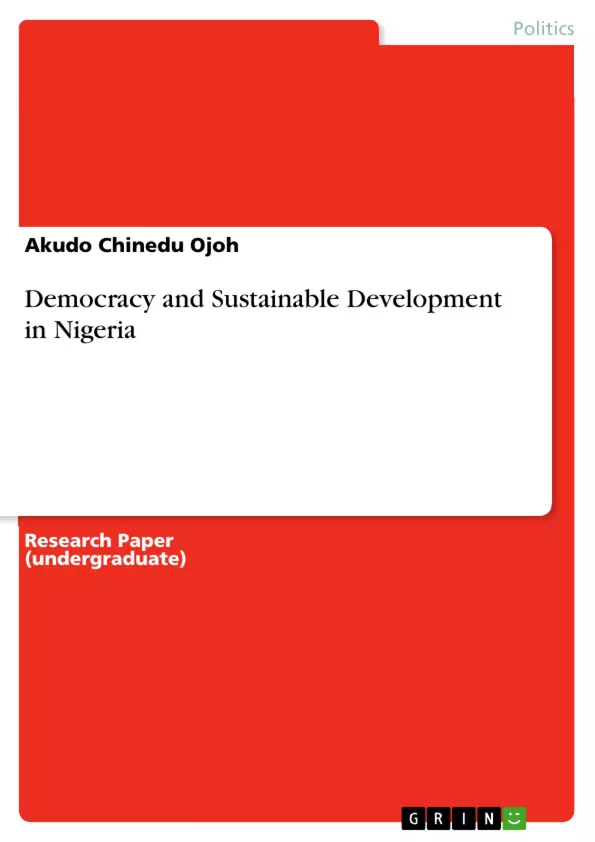In contemporary time, democracy has turned out to be the most supported political tool for development and social change, which has attained near global acclaim and admiration by many world leaders. Although it is contestable, the reasons for this vary. First, democracy has gained acceptability as a form of government based on equity and justice. Secondly, it purports to uphold the rule of law, and as well, guarantee the preservation of human rights.
As it is assumed that effective strategies adopted and properly implemented by a nation have the tendency to accelerate progress in the development of the said nation, this work examined some strategies for sustainable development in Nigeria. It highlighted existing strategies for development in the country, examined progress and challenges in implementing the strategies, and further identified measures which when adopted and implemented, will likely change the social, economic, and political condition of the country for economic growth and sustainable development.
Inhaltsverzeichnis (Table of Contents)
- ABSTRACT
- INTRODUCTION
- DEMOCRACY AND DEVELOPMENT
- SUSTAINABLE DEVELOPMENT
- HISTORICAL BACKGROUND OF NIGERIA
- NIGERIA'S DEVELOPMENT STRATEGIES: 1960 -TO DATE
- ACHIEVEMENTS AND CHALLENGES
- CHALLENGES IN THE IMPLEMENTATION OF THE MILLENNIUM DEVELOPMENT GOALS
- Education
- Health
- STRATEGIES FOR SUSTAINABLE DEVELOPMENT IN NIGERIA
- ADMINISTRATIVE REFORMS
- Accountable and Transparent Governance
- Curbing Endemic Corruption
- SOCIAL REFORMS
- Halting the Wave of Crisis
- Improving the Standard of Education
- Stabilizing Population Growth
- MACRO-ECONOMIC REFORMS
- Technology Adoption
- Local Industrialization and Production
- Harmonization of Tariffs
- INFRASTRUCTURE
- Improving the Basic Infrastructure
- SOCIAL MOBILIZATION
- Engendering Development
- Civil Society Participation
- Monitoring and Evaluation
Zielsetzung und Themenschwerpunkte (Objectives and Key Themes)
This work explores the complex relationship between democracy and sustainable development in Nigeria, examining strategies adopted for development since independence and identifying potential solutions for achieving sustainable progress. It aims to provide valuable insights for policymakers, planners, and development practitioners in Nigeria, as well as offering relevant information for other developing countries.
- The relationship between democracy and sustainable development in Nigeria.
- Strategies for sustainable development in Nigeria from 1960 to present.
- Challenges to implementing sustainable development strategies in Nigeria.
- Proposed strategies for achieving sustainable development in Nigeria.
- The role of democratic institutions and governance in promoting sustainable development.
Zusammenfassung der Kapitel (Chapter Summaries)
- Abstract: This chapter outlines the key arguments and objectives of the work, highlighting the focus on examining strategies for sustainable development in Nigeria.
- Introduction: This section provides a general introduction to the study and the significance of democracy in contemporary world affairs, while also acknowledging the complexities of its implementation in developing countries, particularly in Africa.
- Democracy and Development: This chapter explores the concept of democracy as a system of governance that promotes citizen participation and decision-making, emphasizing its potential to contribute to development and the collective good.
- Sustainable Development: This chapter delves into the conceptual framework of sustainable development, outlining its key principles and goals.
- Historical Background of Nigeria: This chapter provides a concise overview of Nigeria's historical context, offering insights into the country's development trajectory.
- Nigeria's Development Strategies: 1960 -TO DATE: This chapter examines the various development strategies implemented by Nigeria since independence, highlighting their successes and failures.
- Achievements and Challenges: This chapter assesses the achievements and challenges encountered in implementing Nigeria's development strategies, offering a balanced perspective on progress made and obstacles faced.
- Challenges in the Implementation of the Millennium Development Goals: This chapter explores the specific challenges encountered in implementing the Millennium Development Goals (MDGs) in Nigeria, focusing on key areas like education and health.
Schlüsselwörter (Keywords)
This work focuses on the key concepts of democracy, sustainable development, and development strategies in the context of Nigeria. Key themes include the relationship between democracy and development, challenges to implementing sustainable development strategies, and potential solutions for achieving sustainable growth in Nigeria. This analysis incorporates insights from Nigeria's historical context, economic policies, and social realities.
Frequently Asked Questions
How does democracy contribute to development in Nigeria?
Democracy is viewed as a form of government based on equity, justice, and the rule of law, which encourages citizen participation to promote the collective good.
What are the main challenges to sustainable development in Nigeria?
Key challenges include endemic corruption, inadequate infrastructure, waves of social crisis, and difficulties in implementing the Millennium Development Goals (MDGs).
What administrative reforms are proposed for Nigeria?
Proposed reforms focus on accountable and transparent governance and specific measures to curb corruption within the political and economic systems.
How can education and health be improved in Nigeria?
The work suggests improving the standard of education and stabilizing population growth as vital steps to overcome current hurdles in the social sector.
What is the role of technology in Nigeria's macro-economic reforms?
Technology adoption, local industrialization, and the harmonization of tariffs are identified as strategies to accelerate economic growth and sustainable progress.
- Quote paper
- Akudo Chinedu Ojoh (Author), 2008, Democracy and Sustainable Development in Nigeria, Munich, GRIN Verlag, https://www.grin.com/document/191373



